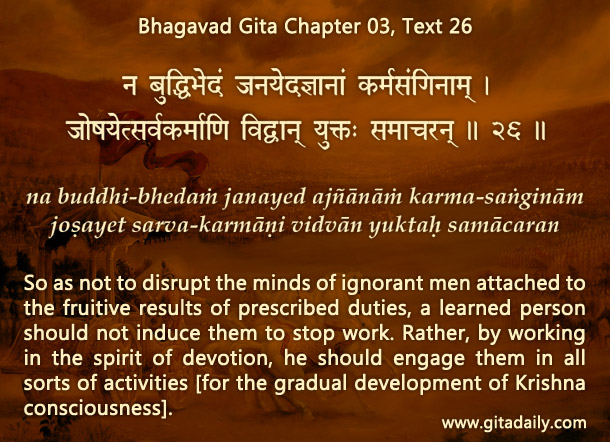Make judgments but don’t be judgmental
When doing anything responsible, we need to make judgments: we need to evaluate who is suitable for doing what and who isn’t. If someone tends to overeat, our making them in-charge of food at a get-together would be an error of judgment. By learning to make sound judgments, we can get things done effectively.
However, while making judgments, we can easily cross the line from evaluating to labeling, thereby becoming judgmental. When we become judgmental, we affix permanent labels on people based on their limitations and even reduce them to those labels, say, gluttons. Even if we try to be externally polite, we give off negative vibes that alienate them. Worse still, becoming judgmental can infect us with a constant critical mentality that may impair all our interactions and relationships.
How can we avoid becoming judgmental? By learning to see and focus on the good in others. Gita wisdom aids such a shift of vision by stressing that everyone is essentially a pure soul, a part of the all-pure Supreme, Krishna. Their limitations are due to the impurities temporarily occupying their mind and body.
Pertinently, the Bhagavad-gita (03.26) urges us to not disturb the minds of those who are ignorant and attached, but to instead engage them expertly for their gradual spiritual growth. This verse conveys the need to make judgments: we need to discern if someone is lacking in knowledge or detachment. Simultaneously, it doesn’t recommend becoming judgmental: rather than labeling them as ignorant or attached, we can evaluate how they can grow from where they are. Then, we can direct them along that way – sensitively, intelligently, encouragingly.
When we thus learn to make judgments without becoming judgmental, we can help others bring out their higher side and manifest their spiritual potential.
Think it over:
- How is making judgments helpful?
- How is becoming judgmental harmful?
- How does Gita wisdom help us to make judgments without becoming judgmental?
***
03.26 So as not to disrupt the minds of ignorant men attached to the fruitive results of prescribed duties, a learned person should not induce them to stop work. Rather, by working in the spirit of devotion, he should engage them in all sorts of activities [for the gradual development of Krishna consciousness].

To know more about this verse, please click on the image
Explanation of article:
https://www.youtube.com/watch?v=2SaFBEf0wVU
Podcast:


JAPA guides you for timely judgement